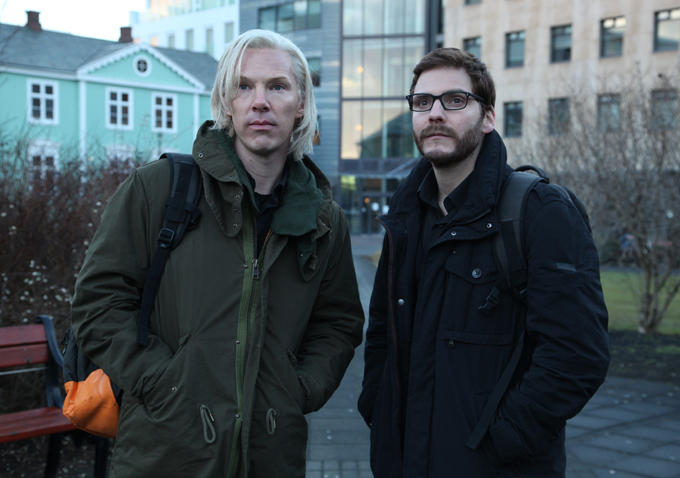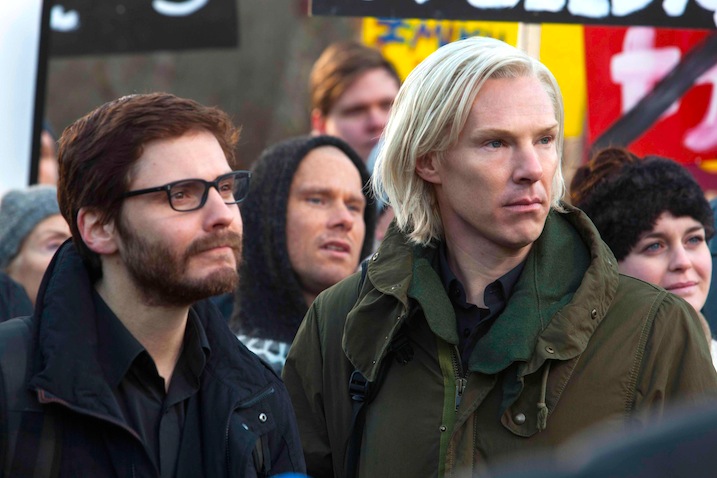By providing your information, you agree to our Terms of Use and our Privacy Policy. We use vendors that may also process your information to help provide our services. This site is protected by reCAPTCHA Enterprise and the Google Privacy Policy and Terms of Service apply.
Toronto Review: Benedict Cumberbatch Is A Fine Julian Assange, But Bill Condon’s Festival Opener ‘The Fifth Estate’ Can’t Do Justice to the WikiLeaks Story
Eric Kohn


Julian Assange is among the most captivating figures of the internet age partly because history has yet to reach a verdict about him. Living in London’s Ecuadorian Embassy since last June to avoid extradition charges, Assange still runs the underground organization WikiLeaks‘ role. His persistence either testifies to his fierce principles or brash egotism, depending on where you fall on the issue. WikiLeaks’ decision to publish previously anonymous sources among the millions of files on the U.S. war in Afghanistan, all of which were leaked by the recently sentenced ex-soldier Chelsea Manning, have positioned the understandings of Assange’s operation somewhere between recklessness and unbridled activism.
With so many factors in play and Assange’s fate still developing, the idea of an Assange biopic might seem premature. But that’s the least problematic issue plaguing Bill Condon‘s “The Fifth Estate,” an uneven, intermittently thoughtful but largely preachy overview of WikiLeaks’ rising influence that has less of an issue determining Assange’s character than it does with telling a compelling story.
With rising star Benedict Cumberbatch in the lead role, buried under long blond hair and a thick Australian accent, “The Fifth Estate” gets one thing right: The actor looks and talks the part with a jittery intensity comparable to Jessie Eisenberg’s similarly passionate techie in David Fincher’s “The Social Network.” Unlike Fincher’s eloquent approach, however, “The Fifth Estate” has none of the observational insight found in Aaron Sorkin’s wry script; instead, Condon’s take messily oscillates between ham-fisted ideological sermons and the ingredients of a cyber thriller.
Unsurprisingly given the erratic nature of the material, Josh Singer’s screenplay draws from two different books about the subject. “WikiLeaks: Inside Julian Assange’s War on Secrecy” provides a researched history of the site, but “Inside WikiLeaks: My Time with Julian Assange at the World’s Most Dangerous Website” was written by former Assange colleague Daniel Domscheit-Berg, played by Daniel Brül in “The Fifth Estate” in a continually flustered state as he flails about in Assange’s shadow. It doesn’t take long to relate to his conundrum.
Too self-serious to play like satire, the broad drama of “The Fifth Estate” seems at once to deride Assange for carelessly putting his principles ahead of others’ security and to relish the technological fetishes of his world: From the very beginning, the movie is peppered with basic CGI graphics to elaborate on the viral element of his cause. With a swirling globe covered in streaming lines from one country to another, Condon signifies the unstoppable surge of WikiLeaks’ influence. As Assange and Berg obsessively tap out code and engage with clandestine sources across a secure server, Condon regularly cuts to images of them working in an impossible beachside outdoor office space, a feeble attempt to figuratively represent the untethered possibilities of the web. As much as it tries to justify the overreaching visuals, “The Fifth Estate” can’t match the grandiosity with its plot specifics.
Starting in 2007, when longtime cyberpunk Assange recruits Berg to his cause, the movie finds the character lost in the vain pursuit of radical activism that routinely falls on deaf ears. His situation changes overnight when the duo comes across documents detailing the corrupt antics of Swiss bank Julius Baer and sends them out into the ether, instantly putting WikiLeaks on the map. “He’s bigger than the Times!” asserts one befuddled journalist contemplating the ramifications of Assange’s power. He’s so big, in fact, that “The Fifth Estate” can’t figure out how to fit his outsized personality into the story without repeatedly simplifying it.

Even Domscheit-Berg, Assange’s ostensible partner-in-crime, falls victim to his influence — a situation thinly demonstrated with a perfunctory subplot that finds Assange getting in the way of Berg’s relationship with his new girlfriend (Alicia Vikander). “You’ll never be like him!” she says to his dismay. But only Assange can convince him. WikiLeaks’ second in command finally thinks twice about his allegiances when Assange turns on Berg after he disagrees with Assange’s decision to release the names of confidential government sources overseas. These events take place with the elementary quality of browsing Assange’s own Wikipedia page. Neither emotionally involving or believable, like WikiLeaks, they’re mainly concerned with the basic facts.
Even the occasional stabs at exploring Assange’s curious backstory, including his childhood in an eccentric cult and an estranged teenage offspring, suffer from the bluntness of bullet points. The movie sometimes works fine on that level by providing a meaty debate on the boundaries of free speech, but the lackluster treatment of Assange’s persona prevents the movie from sublimating its ideas into the main narrative.
The overstatement surrounding Assange’s significance looks particularly crass when viewed in contrast to a compelling side plot involving frantic U.S. defense secretary Sarah Shaw (Laura Linney) who battles to protect one of her sources against the revelations of the Manning documents. Linney, speaking in a witty staccato that’s the closest the movie comes to echoing Sorkin-level vitality, brings a clarity to the unprecedented sense of unease generated by Assange’s work. By contrast, other scenes strain from contrived circumstances that reflect the very type of artificiality WikiLeaks was designed to dismantle.
Condon, a proficient filmmaker whose screenplays for “Gods and Monsters” as well as “Kinsey” demonstrated a capacity for smart biographical storytelling, seems incapable of grappling with Assange’s slippery nature. By the end, Assange has virtually hacked the project: When Cumberbatch speaks out in character against the production of the movie, “The Fifth Estate” winds up its own worst critic.
Criticwire grade: C
HOW WILL IT PLAY? DreamWorks releases “The Fifth Estate” in October. Interest in Cumberbatch’s performance and the Assange story may help the movie receive decent exposure in its initial release, but it’s not an awards contender or enough of a milestone achievement to gain much of a sustained reception.
By providing your information, you agree to our Terms of Use and our Privacy Policy. We use vendors that may also process your information to help provide our services. This site is protected by reCAPTCHA Enterprise and the Google Privacy Policy and Terms of Service apply.
















